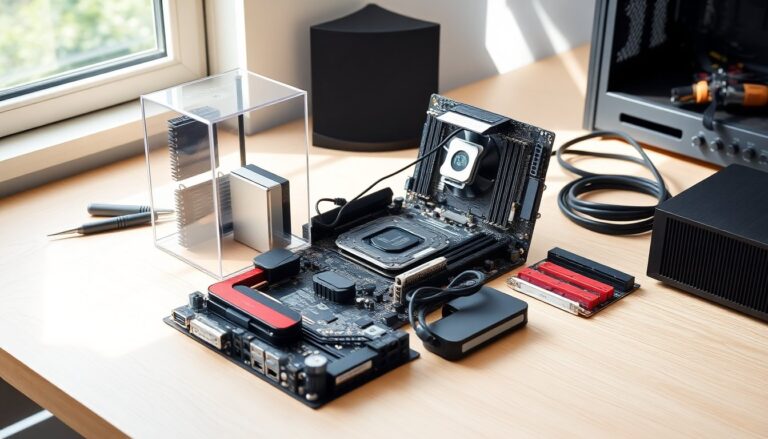Argomenti trattati
Building a budget gaming PC can seem overwhelming, particularly for those new to PC gaming. However, with the right information and components, you can assemble a machine that meets your gaming requirements while remaining cost-effective. This guide outlines the essential components to create a powerful yet affordable gaming PC.
Key components for your budget gaming PC
To construct a budget gaming PC, several key components must be considered: the CPU, GPU, motherboard, RAM, storage, and power supply. Each component is crucial to the overall performance of your system. Below, we will examine each component in detail.
Choosing the right CPU
The central processing unit (CPU) acts as the brain of your gaming PC. For budget builds, processors from AMD’s Ryzen series or Intel’s Core i3 and Core i5 lines are recommended. The AMD Ryzen 5 5600X is a well-regarded option, known for its impressive price-to-performance ratio. It features 6 cores and 12 threads, making it suitable for gaming and multitasking.
Alternatively, Intel’s Core i5-11400 is another strong contender, offering comparable gaming performance at a similar price. Always ensure that the CPU is compatible with your chosen motherboard to avoid potential issues.
Graphics card options
The graphics processing unit (GPU) is essential for delivering smooth graphics in games. Affordable options are available from both AMD and NVIDIA. For instance, the NVIDIA GeForce GTX 1650 and the AMD Radeon RX 6500 XT serve as excellent choices for entry-level gaming.
These graphics cards can handle most games at 1080p resolution with decent settings, providing a satisfying gaming experience without excessive costs. However, the GPU market can be volatile, so it is advisable to check for the best deals regularly.
Additional components to complete your build
Motherboard selection
The motherboard serves as the backbone of your build, connecting all components. It is crucial to select a motherboard that supports your CPU and GPU. For budget builds, a micro-ATX or ATX motherboard is generally sufficient. Look for features like PCIe 4.0 support for future-proofing and multiple RAM slots for potential upgrades.
Popular choices include the ASUS TUF Gaming B550M-Plus for AMD configurations and the MSI B560M PRO-VDH for Intel setups. Ensure the motherboard has sufficient ports for your peripherals and storage options.
Memory and storage considerations
RAM is another critical component of your gaming PC. Aim for at least 16GB of DDR4 RAM to ensure smooth multitasking and gaming performance. Brands such as Corsair and G.Skill provide reliable options within budget.
Storage is equally important; consider a combination of a solid-state drive (SSD) for your operating system and a larger hard disk drive (HDD) for games and files. An SSD significantly improves load times, enhancing the gaming experience. A 500GB SSD paired with a 1TB HDD represents a balanced approach.
Power supply and case selection
Power supply considerations
To construct a budget gaming PC, several key components must be considered: the CPU, GPU, motherboard, RAM, storage, and power supply. Each component is crucial to the overall performance of your system. Below, we will examine each component in detail.0
Choosing the right case
To construct a budget gaming PC, several key components must be considered: the CPU, GPU, motherboard, RAM, storage, and power supply. Each component is crucial to the overall performance of your system. Below, we will examine each component in detail.1
To construct a budget gaming PC, several key components must be considered: the CPU, GPU, motherboard, RAM, storage, and power supply. Each component is crucial to the overall performance of your system. Below, we will examine each component in detail.2

